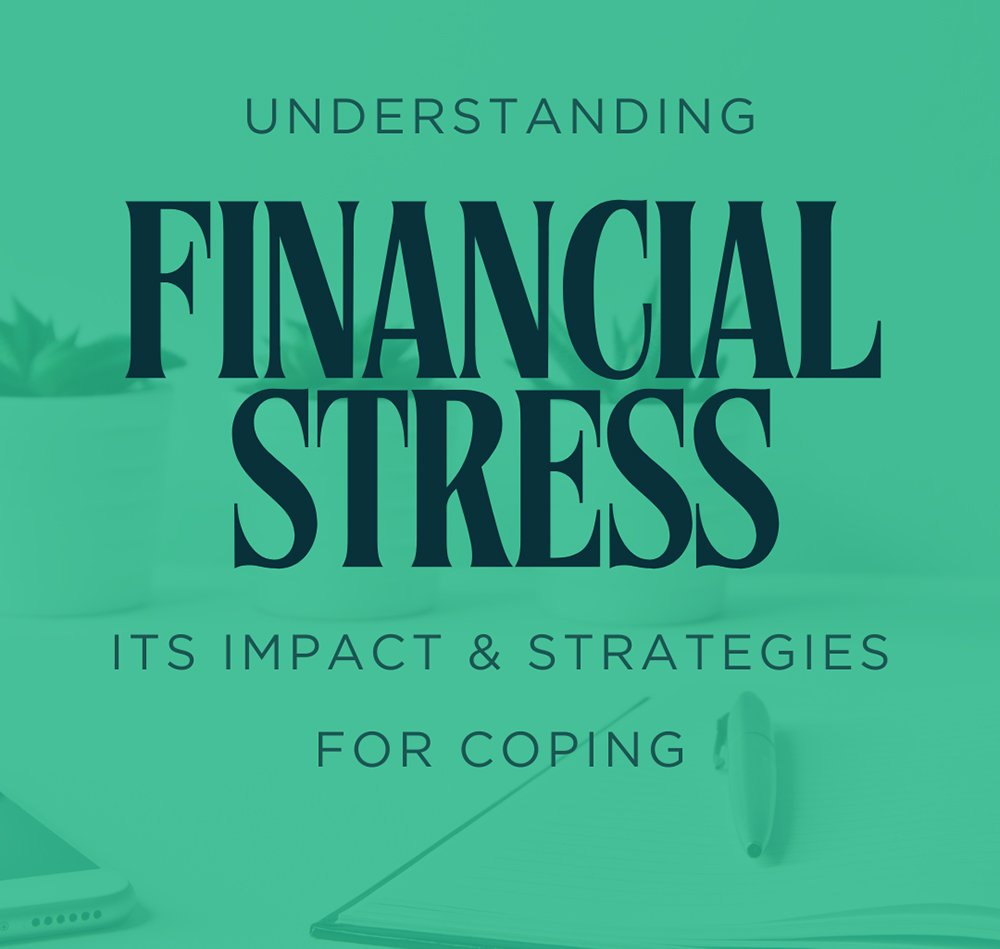
11 Jul Understanding Financial Stress: Its Impact and Strategies for Coping
Financial stress is a prevalent issue affecting individuals and families across the globe. This emotional and psychological strain arises from concerns about money, debt, and financial stability. Understanding the various aspects of financial stress and how it impacts mental health and relationships can help you navigate this challenging terrain.
What is Financial Stress?
Financial stress encompasses a wide range of concerns related to money and financial stability, including:
- Debt Burden: Struggling to manage debts, such as credit card debt, student loans, and mortgages, can lead to significant stress.
- Income Instability: Fluctuating income, irregular paychecks, or job insecurity make budgeting and financial planning challenging, causing anxiety about meeting basic needs.
- Unforeseen Expenses: Sudden emergencies, like medical bills, car repairs, or home maintenance, can create unexpected financial pressures.
- Lack of Savings: Insufficient savings for emergencies or retirement can generate worry about long-term financial security.
- Job Loss or Underemployment: Losing a job or being underemployed disrupts financial stability, making it difficult to cover expenses.
- Rising Living Costs: When the cost of living increases faster than income growth, it becomes harder to make ends meet.
- Financial Goals: Striving to achieve financial goals, such as buying a home or saving for retirement, can lead to stress when progress is slow.
In today’s volatile global economy, these concerns are amplified. Job insecurity, income fluctuations, and rising living costs create a perfect storm for financial stress. Medical expenses, increasing student loan debt, and the shift away from traditional pensions to personal retirement savings add to the burden. Societal pressures to maintain a certain lifestyle, fueled by social media comparisons, further exacerbate financial stress.
How Financial Stress Impacts Mental Health
Financial stress significantly impacts mental health, often leading to:
- Depression: The helplessness and hopelessness associated with financial difficulties can contribute to depression.
- Anxiety: Constant worry about debt and financial instability can trigger the body’s stress response, leading to persistent anxiety.
- Substance Abuse: Financial stress has been linked to higher rates of substance use as individuals seek temporary relief.
- Physical Health Issues: Chronic stress can lead to physical symptoms such as headaches, digestive problems, and sleep disturbances.
- Increased Risk of Suicide: Financial difficulties are closely connected to higher rates of self-harm behaviors and suicide.
Financial Stress and Relationships
Financial worries can strain relationships with partners, family members, and friends. Conflicts over money can lead to arguments, resentment, and isolation, negatively affecting one’s social support system. People under financial stress may avoid sharing their concerns, suffering in silence and further isolating themselves.
Coping Mechanisms and Unhealthy Responses
Financial stress can lead to unhealthy coping behaviors like overeating, substance abuse, or overspending. These behaviors may provide temporary relief but often worsen mental health in the long run. Additionally, financial stress can make it harder to cope with other life stressors, depleting emotional and psychological resources.
Strategies for Managing Financial Stress
Here are 15 practical strategies to help manage financial stress and protect your mental well-being:
1. Create a Realistic Budget: Outline your income, expenses, and savings goals to understand your financial situation clearly.
2. Seek Professional Financial Guidance: Consult a financial advisor for expert advice on managing finances and reducing debt.
3. Practice Mindfulness and Stress Reduction: Engage in mindfulness meditation, deep breathing exercises, or yoga to manage stress.
4. Limit Exposure to Financial News: Avoid overconsumption of negative financial news that might increase anxiety.
5. Build a Support Network: Maintain open communication with friends and family about your financial challenges.
6. Focus on What You Can Control: Concentrate on actionable steps to improve your financial situation.
7. Prioritize Self-Care: Invest time in activities you enjoy to boost your mental well-being.
8. Set Realistic Goals: Break down financial goals into smaller, achievable steps.
9. Explore Additional Income Streams: Supplement your income through freelance work or part-time jobs.
10. Practice Gratitude: Acknowledge the positive aspects of your life regularly.
11. Educate Yourself: Learn about personal finance and money management to make informed decisions.
12. Stay Connected to Mental Health Resources: Seek professional help from therapists or support groups if needed.
13. Break Tasks into Manageable Steps: Tackle financial issues one step at a time.
14. Maintain a Long-Term Perspective: Remember that financial stress is often temporary and can improve with planning.
15. Avoid Comparisons: Refrain from comparing your financial situation to others.
Seeking Additional Support
Recognizing the complex relationship between financial worries and mental health is crucial. Financial struggles can lead to mental health issues, and poor mental health can make managing finances more challenging. Seeking support from mental health professionals, financial advisors, and social support networks is vital.
At Level Coaching, we offer comprehensive support to help you navigate financial stress. Contact us today to learn more about our services and how we can assist you in achieving financial stability and overall wellness.
By understanding financial stress and implementing strategies to manage it, you can protect your mental well-being and build a more secure financial future.

